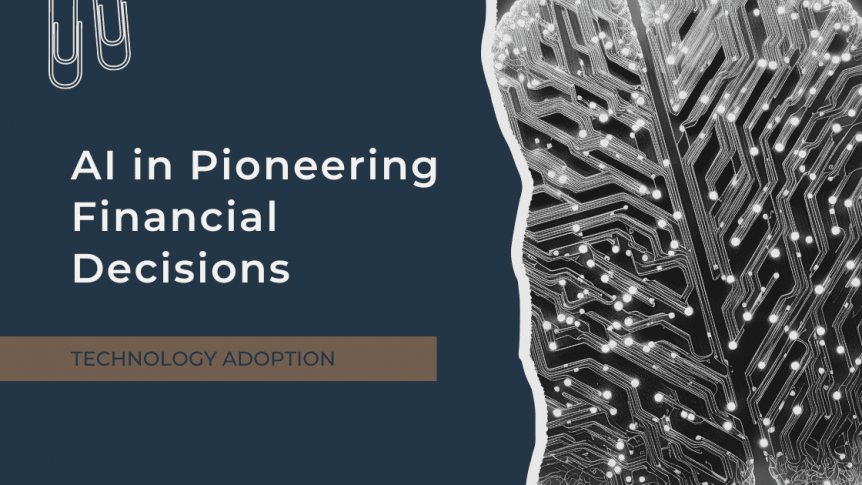Full article with thanks to: techround.co.uk/guides/8-ways-ai-impact-financial-decision-making
With technology rapidly progressing, it’s evident that artificial intelligence has gained prominence in the finance sector. AI is revolutionising decision-making processes in areas such as investment and risk management for financial institutions and underwriters, ranging from underwriting workbenches to other key decision making processes.
As we contemplate the future of decision-making in finance, it’s imperative to grasp the advantages and potential pitfalls associated with adopting this innovative technology.
What is AI?
Artificial intelligence, commonly known as AI, has surged in popularity within today’s technological realm.
In essence, AI encompasses machines and computer programmes’ capability to learn and execute tasks that conventionally demand human intelligence. AI can be categorised into two primary types: narrow AI and general AI.
Narrow AI: Task-Specific Intelligence
Narrow AI, also known as task-specific AI, excels in performing particular tasks, such as image recognition or language translation. Unlike general AI, narrow AI focuses on mastering a specific domain rather than simulating human-like cognitive abilities.
General AI: Emulating Human Intelligence
General AI, in contrast to narrow AI, aims to replicate human cognitive abilities, striving to create machines with intelligence akin to humans. This ambitious endeavour seeks to develop artificial brains capable of reasoning, learning, and adapting across diverse domains and tasks.
What to Consider When Using AI When Making Financial Decisions
While AI holds significant promise in finance, it also brings forth notable challenges and ethical concerns, particularly within the financial sector. These encompass the necessity for a deep comprehension of AI algorithms, data protection and the importance of human oversight. Explore these further below:
Clear Understanding
AI algorithms can be complex and hard to understand, which can raise concerns about fairness and accountability.
Human Input
It’s crucial to remember that AI shouldn’t replace human judgment. People need to oversee AI systems to ensure they’re used ethically.
Data Privacy
Using AI in finance brings up worries about keeping personal information safe. Financial companies need to have strong rules in place to protect customer data.
8 Ways That AI Will Impact Financial Decision Making
AI stands ready to profoundly influence financial decision-making across multiple dimensions. Its capacity to enhance precision, automate tasks, provide personalised solutions, manage risks, optimise portfolios, and revolutionise customer support positions it as a transformative force in financial decision-making.
Explore our top 8 ways AI will impact financial decision-making below:
Enhanced Precision and Data-Driven Insights
AI algorithms excel at analysing extensive datasets with heightened accuracy, uncovering patterns that may elude human analysts. This fosters informed, data-centric decisions, ultimately enhancing financial outcomes.
Streamlined Operations and Increased Automation
AI’s capacity to automate repetitive tasks and processes liberates financial professionals to concentrate on strategic initiatives, bolstering operational efficiency and slashing costs.
Tailored Financial Solutions
AI has the capability to customise financial recommendations and services according to individual customer requirements and risk profiles. This personalised approach fosters greater customer satisfaction and loyalty.
Risk Management and Fraud Detection
AI-driven risk management and fraud detection systems swiftly identify potential risks and fraudulent activities, preempting financial losses and safeguarding both institutions and clients.
Optimising Portfolios and Managing Assets
Through the analysis of extensive datasets, AI effectively manages investments and assets, offering valuable insights for investment strategies. This results in more informed decisions and improved performance.
Automation of Repetitive Tasks
AI offers another avenue to support finance teams: automating repetitive tasks. For instance, an AI algorithm could generate financial reports or predict revenue projections. This automation not only saves time but also minimises errors, allowing financial professionals to concentrate on intricate tasks demanding human expertise.
Tailored Financial Guidance
By scrutinising individual financial data, spending habits, and risk assessments, AI can offer personalised financial suggestions and investment counsel. This customised strategy empowers customers to make well-informed financial choices that match their objectives and risk preferences.
Customer Support and Chatbots
Revolutionising customer service interactions, AI-driven chatbots offer round-the-clock assistance, addressing inquiries and resolving concerns promptly. This elevates customer contentment while slashing operational expenses for financial establishments.
In summary, the integration of artificial intelligence (AI) into financial decision-making processes represents a significant advancement in the sector. AI’s ability to enhance precision, automate tasks, provide tailored solutions, manage risks, optimise portfolios, and revolutionise customer support underscores its transformative potential.
As we navigate this technological landscape, it’s crucial to remain mindful of the need for clear understanding, human oversight, and data privacy considerations when leveraging AI in finance. With careful consideration and strategic implementation, AI stands poised to revolutionise financial decision-making, driving improved outcomes and enhanced customer experiences in the years to come.
Full article with thanks to: techround.co.uk/guides/8-ways-ai-impact-financial-decision-making
Did you enjoy that? Why not share this article.
We specialise in supporting change across the insurance sector, helping insurance businesses (and other businesses like distribution and logistics) adapt seamlessly.
Our services include Change & Transformation, M&A Integration, Business Process Management and Executive Coaching. We help make organisational change and technology change much easier.
Got a question about our services? Get in touch and leave a message

